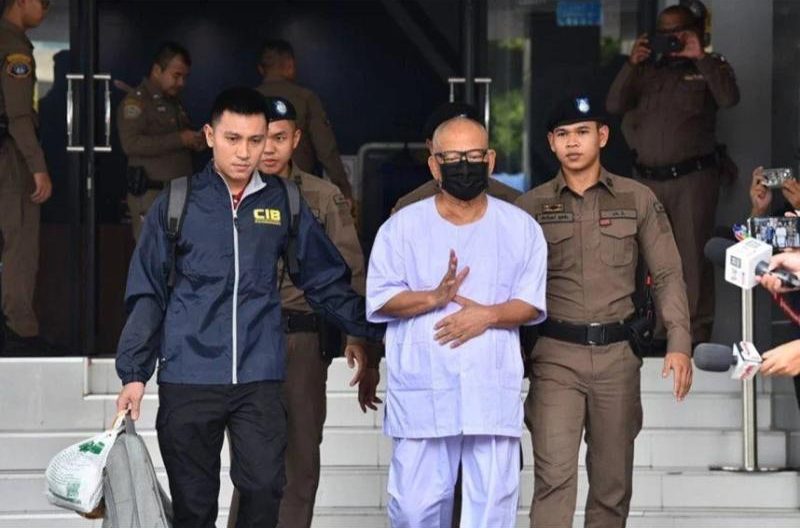Monk on the Run or The Temple of Doom

How a Buddhist monk allegedly stole $9 million from his own temple to gamble it away on online Baccarat. And how the police infiltrated the temple In a way that would have made Robbie Coltrane proud.
This should really be a British comedy movie, but in Thailand, it’s a crime novel.
Play Baccarat in the best Online Casinos
Just click on the images to register. You can find a full casino list here.
The Orange Abbot
A shocking scandal has emerged from Thailand’s revered Wat Rai Khing temple, where authorities allege that its abbot, Phra Thammachiranuwat, secretly siphoned off more than 300 million baht (approximately US $9.05 million) to fuel an online baccarat addiction.
Thai police from the Central Investigation Bureau (CIB) say they traced a series of transfers from the temple’s donation accounts — funded by devotees seeking merit-making — to private bank accounts controlled by the monk.
He was taken into custody after voluntarily surrendering on May 15, 2025, and has since been charged with corruption and malfeasance under Thai anti-graft laws.
70 Years outside Tibet
Wat Rai Khing, founded in 1851 and famed for housing a replica of the Buddha’s footprint, has long been a focal point of religious tourism on Bangkok’s western outskirts.
Donations at this temple underpin community services and maintenance of its historic grounds. Devotees typically contribute during merit-making ceremonies, trusting clergy to steward their gifts ethically.
Investigators say that over a period of months, the 70-year-old abbot diverted these pilgrims’ offerings. The money landed in accounts linked to an illegal online baccarat network. He was betraying the very faith-based mission he was entrusted to uphold.
The Temple of Doom
The alleged embezzlement was uncovered after an undercover CIB operative embedded within temple financial operations for eight months uncovered anomalous withdrawals and transfers. the only explanation: a monk stole the money.
Police reports detail that funds were first moved from the temple’s official accounts into a series of personal accounts. All were held by the abbot, who then funneled the money through intermediaries to online gaming platforms such as LAGALAXY911.
A key accomplice, a former temple aide named Ekkapot Phukhang (also known as Phra Maha Ekkapot), confessed to ferrying cash via ATMs and directing it toward the gambling broker, Aranyawan Wangthapan, who is now also in custody.
The Name of the Robe
In a public ceremony on May 15, Phra Thammachiranuwat was formally disrobed. That means he had to take off his saffron robes before investigators and media witnesses.
The ritual of disrobing symbolically underscored his fall from religious grace. Under Thai law, high-ranking monks are state officials and adhere to strict fiduciary duties.
Assistant Commissioner Jaroonkiat Pankaew of the CIB emphasized that the arrest “is to help purify our religion,” signaling a broader crackdown on clerical misconduct.
Authorities have indicated the investigation remains open, with the possibility of further arrests (nationthailand, CBS News).
Eat Play Gamble
News of the monk’s betrayal has reverberated across social media platforms, prompting intense public debate.
One user lamented, “Next time I will donate to a hospital or school for good causes, not a temple,” while others cautioned against blanket mistrust of the clergy, noting “not all monks are bad. Don’t generalize.”
A Reddit user sarcastically commented. “In his defense, Buddha never told anyone to not punt 300 million Baht of temple funds on Baccarat.”
The scandal has ignited calls for reform in temple financial oversight. Lay committees and government watchdogs are now facing pressure to impose stricter auditing of donations and disbursements.
Commentary pieces in national outlets have urged devotees to engage more actively in temple governance to restore confidence.
Kundun
Beyond the immediate fallout, this case raises profound questions about the intersection of faith, corruption, and digital technology in modern religious institutions.
Buddhist-majority Thailand may now see legislative proposals aimed at enhancing transparency in temple finances, possibly through mandatory public disclosure of high-value transactions and regular audits by independent bodies.
Legal scholars suggest that, if convicted, the former abbot could face significant prison time. This regards both anti-money-laundering statutes as well as restitution orders. The outcome will likely set a precedent for how other nations with prominent religious tourism industries confront similar breaches of trust.
More Selected News for You
You must be logged in to post a comment.



